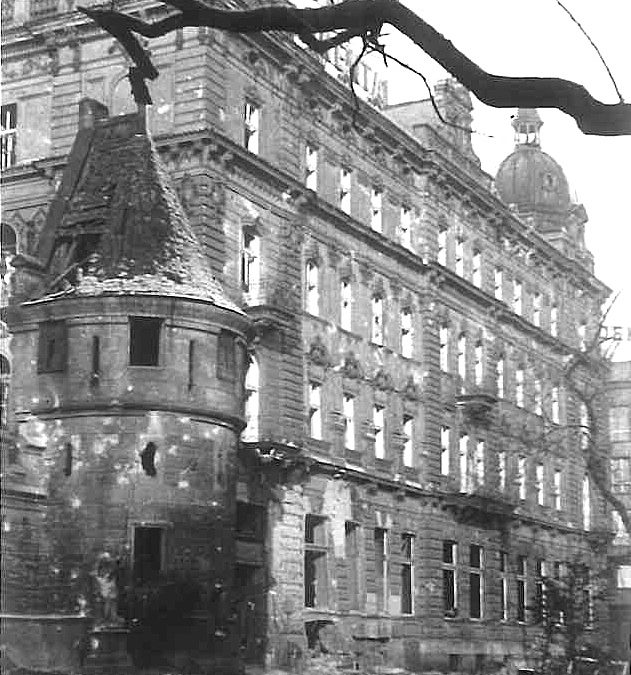I wrote a novel based on the unbelievable true story. It is my pleasure to share the story with you today.
The Hotel Continental was famous before World War 2. It was the favorite place of the high society. During the occupation, the Gestapo loved this place, and then were replaced by US Army officers at the end of the war. General Hinds fell in love with Eugenie Ledecká, a young widow and the hotel owner. He did not forget her and send her a ring from the USA. Instead of a love letter, he received a short message from a young diplomat Jiří Janeček: Veni, vidi, vici.
Eugenie was a charming woman. Still, you can see her picture in the Hotel Continental restaurant. The painting shows her in a dark dress, smiling slightly, her face covered with a shadow of future expectations.
Her fate was not easy. “My mom was not happy,” said her son George Janecek when we accidently met in the United States. “Her mother, my grandmother, pushed her to marry young. She told her: You are dark-haired and you will be gray soon. Do not wait.”
Before the bomb
Eugenie married Emanuel Ledecký, ten years her senior, the son of hotelier and owner of the famous Hotel Continental which was established in 1895. The Ledecky family bought the hotel in 1928 for the price of 3 million crowns.
Eugenie had a magnificent wedding that took place in the hotel. From this time, a series of unpredictable events began. And the reason for marriage? Property. Restaurateur Egert, father of Eugenie, longed to run the Hotel Continental. He organized wedding, so Eugenie married Emanuel. It is said that beautiful Eugenie cried on her way to altar. Then, two children were born: Eugenie and Emanuel.
It happened on December 20, 1944. Their son Emanuel was in the school. His older sister was outside. Eugenie Ledecká was visiting her comatose mother. A minute before she heard the bombs striking Pilsen, she saw her mother move. “She moved her hand like she was calling someone,” Eugenie remembered later.
Shortly after that her mother died. And a few minutes later, the cluster of bombs landed on Pilsen. One bomb hit the southeast corner of the hotel and plummeted through room number 221 where Eugenie used to spend her days. The explosion killed 70 people; among them Eugenie’s father, and husband Emanuel Ledecký.
Free of everything
Ruins were cleared. Bodies were buried. And life went on. Thirty-four-year-old Eugenie had to take care of the hotel’s reconstruction and run it as her husband did. During the liberation, the US Army headquarter was established in the Hotel Continental. General Hinds was accommodated here and he fell in love with the beautiful and young widow. A love, which according to witnesses, was returned. “I was not very happy in my first marriage,” Eugenie admitted. “And for the first time ever since then, I’ve been free, free of everything.”
Eugenie Ledecká and general Hinds spent six weeks together in Pilsen: dining outside, dancing swing, forgetting about the tragedies of war. Then, the general had to return to the United States. He was married and Eugenie knew it that is why she did not take the relationship too seriously. But Hinds was in love. He divorced, bought a ring and he was looking for someone who would deliver a ring to his beloved in Czechoslovakia.
He asked Jan Masaryk, the minister of foreign affairs. But the politician did not have the time, so he asked for a favor from his friend Jiří Janeček, a young diplomat who worked in the United States and who was on his way back to Czechoslovakia to visit his family. Even the young diplomat did not find the time so he asked his cousin to do it. She delivered the ring.
Later, Jiří Janeček was driving in Pilsen and he needed some gas. He stopped at the Hotel Continental and walked in. His brother, who traveled with him, had to wait for one hour. When he came back to the car, he said: “I’ll marry this woman.”
A few days later, Eugenie visited Janeček, holding a letter for Hinds. Right there, she decided not to send the letter. Three weeks later she married Jiří Janeček. The diplomat himself informed the general about the news. He sent him a short message: “Veni, vidi, vici.”
